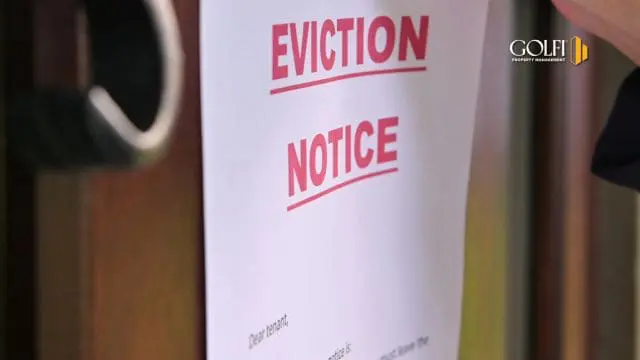Is There a Bad Tenant List? What Is It?
Let’s be honest, dealing with a bad tenant can be a landlord’s worst nightmare, it seems like that late notice for rent didn’t work either this time.
Well, whether it’s late rent, property damage, or legal headaches, a single problematic renter can lead to months of stress and lost income. That’s where something like a bad tenant list in Ontario can be a game-changer.
We work with landlords every day throughout Hamilton, Halton, Niagara, and Brantford, and this question comes up a lot: “Is there an official bad tenant list? And can we access it?”
The short answer is yes, but it’s not what most people think. It’s actually known as the DO NOT RENT list. We’re going to break it all down for you right here.
Let’s walk you through how tenant reporting works in Ontario, the legalities involved, how it protects landlords, and how we at Golfi Property Management make sure your rental business stays safe and profitable.
Some landlords use a “Do Not Rent List” as a strategy to weed out troublesome tenants.
In reality a bed tenant list in Canada is considered illegal in Canada because it becomes a privacy regulation issues and causes many ethical issue as well.But, theres a totally different solution to this, offered that has records of both good and bad tenants all just to enhance the Canadian rental market. This guide is perfect for Canadian landlords wherever you are located such as hot pocket like Ontario, this is exactly how you can be cautious of of tenant behaviours across the board.
We aim to help you understand your obligations so you don’t get caught off guard. Let’s jump in.
Experience hassle-free property management with GOLFI Property Management’s services. Contact us!
Why Landlords Use a Bad Tenant List
We’ve seen too many landlords in Ontario suffer losses that could’ve been avoided with just a bit of shared information. Bad tenant lists provide a safety net and act as a powerful deterrent.
Here’s why landlords across Hamilton and surrounding areas are using this system:
-
Track rent payments and enforce consistency.
-
Deter repeat offenders from continuing bad habits.
-
Save time and money during the screening process.
-
Avoid evictions, which are costly and time-consuming.
-
Protect properties from damage and irresponsible tenants.
It’s about more than just flagging someone as a “bad” tenant. It’s about building a system where tenants are encouraged to pay rent on time and landlords feel supported.
Is There a Legal Bad Tenant List in Ontario?
Yes and no. Ontario doesn’t offer a government-run list, but platforms like Landlord Credit Bureau operate legally within the province. As long as landlords follow the rules, particularly around tenant consent and privacy laws, it’s 100% legal.
The province does have strong tenant protections under the Residential Tenancies Act, so the rules must be followed to the letter. That’s where professional property managers like us come in, we understand the line between protecting landlords and respecting tenant rights.
You can’t just publish someone’s name online or create your own list. That’s illegal. But if you use a licensed platform and follow proper protocol, it’s a legitimate and powerful tool.
How LCB It Works
Platforms like Frontlobby partner with Equifax, meaning reports impact a tenant’s actual credit score.
This makes it a serious incentive for tenants to pay rent on time.
Here’s what it does:
- Allows landlords to report tenant payments monthly.
- Builds or damages a tenant’s credit score depending on behaviour.
- Enables tenant history to be accessed by verified landlords.
- Helps resolve disputes by creating an official record.
It’s not just for flagging bad tenants, it actually helps reward the good ones. And in our experience managing properties across Hamilton, Halton, Niagara, and Brantford, this is a win-win approach.
What Kind of Tenant Information Is Shared?
One of the biggest concerns we hear is, “What kind of info gets reported?”
Valid question. Here’s what’s allowed:
-
Monthly rent payment status (paid, late, missed).
-
Lease length and whether it’s still active.
-
Move-in and move-out dates.
-
Rent arrears and outstanding balances.
What’s not allowed?
-
Personal opinions.
-
Names shared publicly.
-
Any information unrelated to rental performance.
It’s all about facts, no gossip, no drama. This ensures the data is clean, relevant, and legally safe to share.
Is Reporting to a Tenant List Legal in Ontario?
Yes, but here’s the catch: landlords must inform tenants that their rent payments will be reported. Without that notice, it could be seen as a breach of privacy.
At Golfi Property Management, we include this in our lease agreements and walk tenants through it during the move-in process. That way, everyone is on the same page from day one. This also create a good tenant retention rate overtime.
So, yes, it’s legal, but only when done properly and through the right channels.
Privacy Laws & Tenant Rights in Ontario
Tenant rights are heavily protected in Ontario. That’s not a bad thing—but it does mean landlords must be careful. You can’t just vent online or post someone’s name in a Facebook group.
Ontario’s Privacy Act and Residential Tenancies Act make it clear:
- No public shaming.
- No false reporting.
- No sharing personal data without consent.
That’s why we partner with compliant reporting platforms and make sure every action we take is in line with the law.
Can Tenants Dispute a Bad Report?
Yes. Tenants have the right to dispute a report they believe is incorrect or unfair. This is a critical part of the process and ensures the system remains fair.
They can:
- Contact the reporting landlord.
- File a dispute through the tenant reporting platform.
- Provide documentation (receipts, emails, etc.).
- Request removal if the information is found to be inaccurate.
We believe in transparency and fairness, both for landlords and tenants. That’s how trust is built and maintained.
How to Report Bad Tenants in Ontario
If you’re a landlord, you can’t just “create” a bad tenant list.
But you can join a service like the Landlord Credit Bureau, which handles it all legally.
Steps to report a tenant:
- Sign up with a compliant reporting agency.
- Ensure the tenant is notified (ideally in the lease).
- Submit accurate payment records monthly.
- Keep documentation to back up any claims.
- Review your listings regularly for accuracy.
Want us to handle this for you? We do it every day, and we’re happy to help!
Get in touch with Golfi Property Management Team.


